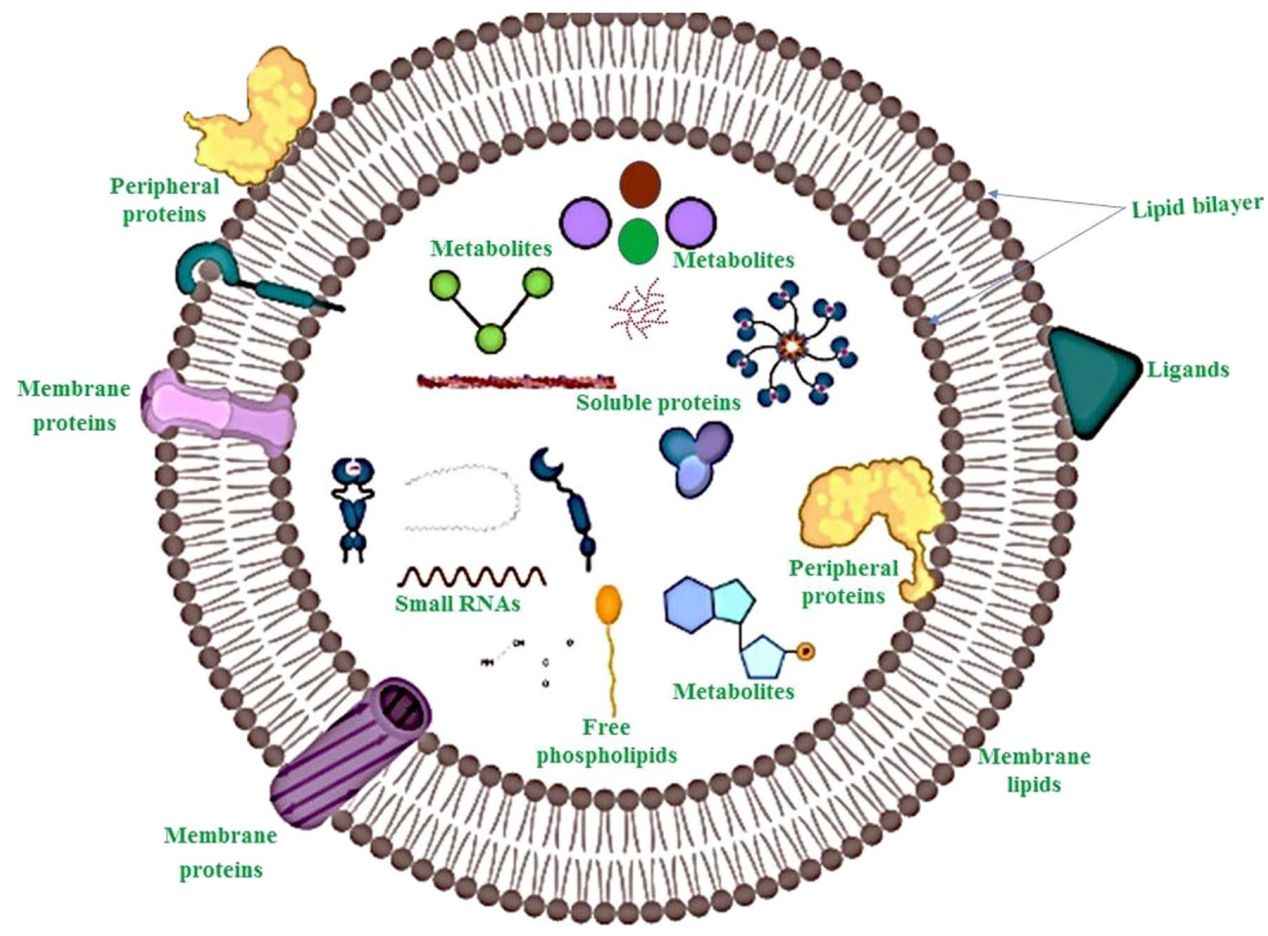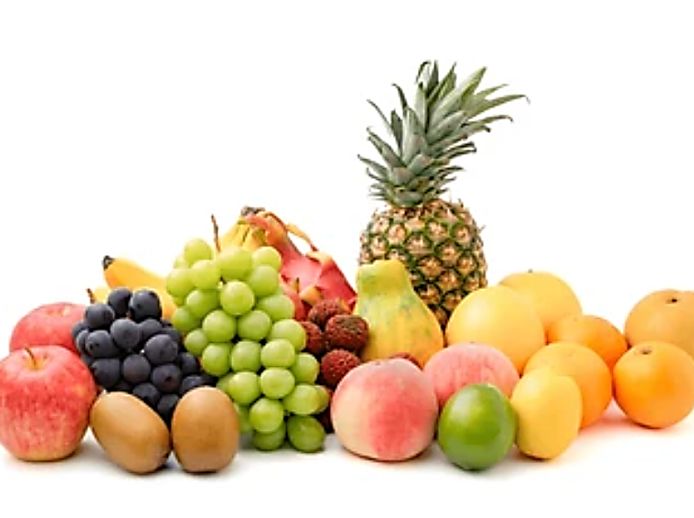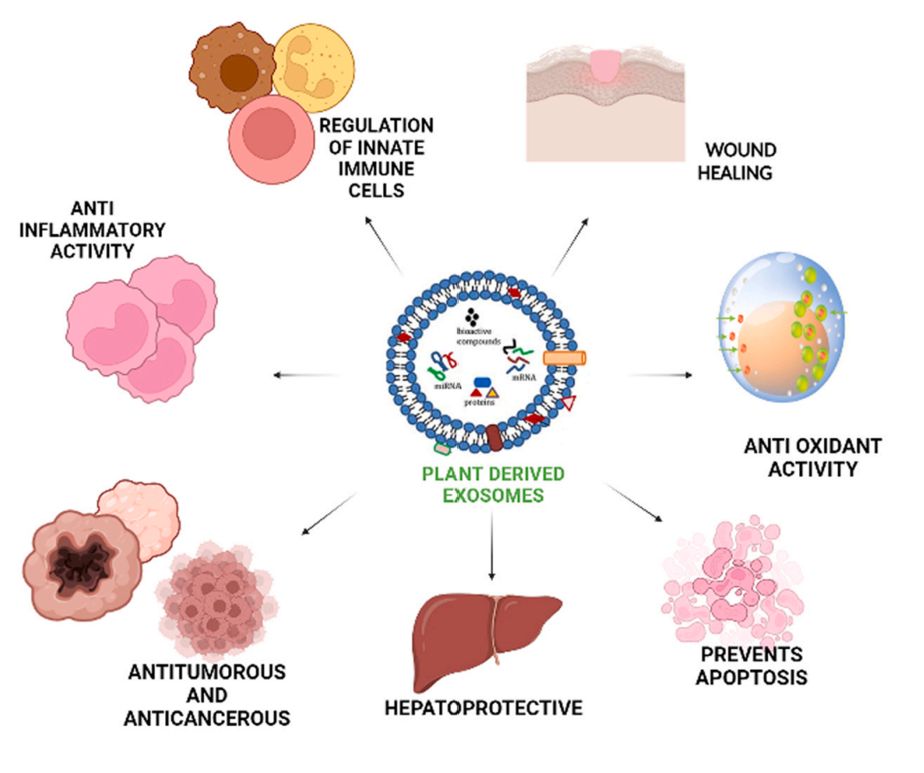What is Plant-derived Exosome?
Plant-derived exosomes are small nanosized vesicles secreted by plant cells containing substances such as DNA, small RNA (sRNA, sRNA), microRNA (miRNA, miRNA), and proteins that mediate intercellular communication. Recent studies have revealed that plant-derived exosomes have therapeutic potential, such as anti-cancer and anti-inflammatory. In addition, most of these exosomes are edible, free of toxicity and side effects, and can be used as carriers for delivering specific drugs. Therefore, plant-derived exosomes have become one of the research hotspots in the field of biomedicine.
 Figure 1. Schematic of the structure and composition of plant-derived exosomes. (Nemati M, et al., 2022)
Figure 1. Schematic of the structure and composition of plant-derived exosomes. (Nemati M, et al., 2022)
Why Choose Plant-derived Exosomes?
- Plant-derived exosomes are of natural origin and safer.
- Plant-derived exosomes carry proteins, lipids, RNA, and a large number of active substances, which have significant regulatory effects in regenerative medicine, immunomodulation, anti-inflammation, and anti-tumor.
- Plant-derived exosomes are small in size, have high tissue penetration, and maintain good physicochemical stability under different acidity and temperature.
- Plant-derived exosomes combine the morphology and characteristics of nanocarriers and show significant advantages in biocompatibility, stability, in vivo distribution, prolonged half-life, and cell internalization, making them an ideal choice of carrier.
What Types of Plant-derived Exosomes?

Flower-derived exosomes are isolated from the cells of flowers such as rose, lavender, and chamomile. These exosomes contain higher concentrations of antioxidants and anti-inflammatory compounds and can be used in skin care products and aromatherapy to promote relaxation and wellness.
| Cat No. | Product Name | Source |
| PNE-FLP04 | PNExo™ Exosome-Lily | Exosome derived from Lily |
| PNE-FLL05 | PNExo™ Exosome-Jasmine | Exosome derived from Jasmine |
| PNE-FLC42 | PNExo™ Exosome-Begonia | Exosome derived from Begonia |
| PNE-FLD51 | PNExo™ Exosome-Daphne | Exosome derived from Daphne |
| PNE-FLM66 | PNExo™ Exosome-Magnolia | Exosome derived from Magnolia |
| Explore All Exosomes Isolated from Flowers | ||

Vegetable-derived exosomes isolated from broccoli, spinach, and turmeric are rich in nutrients, phytochemicals, and bioactive compounds associated with immune regulation, detoxification, and cellular health. These exosomes can be applied topically for their potential therapeutic benefits.
| Cat No. | Product Name | Source |
| Exo-PDELN01 | HQExo™ Exosome-Garlic | Exosome derived from Garlic |
| Exo-PDELN02 | HQExo™ Exosome-Ginger | Exosome derived from Ginger |
| Exo-PDELN03 | HQExo™ Exosome-Onion | Exosome derived from Onion |
| PNE-VB13 | PNExo™ Exosome-Broccoli | Exosome derived from Broccoli |
| PNE-VE31 | PNExo™ Exosome-Enoki | Exosome derived from Enoki |
| Explore All Exosomes Isolated from Vegetables | ||

Fruit-derived exosomes from grapefruit, strawberry, and apple, contain high levels of antioxidants and vitamins that support cardiovascular health, cognitive function, and slow aging, with potential efficacy in antioxidant, anti-inflammatory, and cell regeneration promotion.
| Cat No. | Product Name | Source |
| PNE-FB13 | PNExo™ Exosome-Bilberry | Exosome derived from Bilberry |
| PNE-FA18 | PNExo™ Exosome-Apple | Exosome derived from Apple |
| PNE-FC38 | PNExo™ Exosome-Cranberry | Exosome derived from Cranberry |
| PNE-FB42 | PNExo™ Exosome-Banana | Exosome derived from Banana |
| PNE-FG69 | PNExo™ Exosome-Green Plum | Exosome derived from Green Plum |
| Explore All Exosomes Isolated from Fruits | ||
How do Isolate and Characterize Plant-derived Exosomes?
- Isolation of Plant-derived Exosomes
Currently, the main methods for the isolation of plant-derived exosomes include differential ultracentrifugation, sucrose density gradient centrifugation, ultrafiltration, polymer precipitation, size exclusion chromatography, and microfluidics. The traditional method of isolation of plant-derived exosomes generally involves treating the sample with low-speed centrifugation to remove impurities, followed by high-speed centrifugation to separate the exosomes, and then purification using density gradient centrifugation.
 Figure 2. Schematic of the general method for isolating plant-derived exosomes. (Kim J, et al., 2022)
Figure 2. Schematic of the general method for isolating plant-derived exosomes. (Kim J, et al., 2022)
- Characterization of Plant-derived Exosomes
Accurate and comprehensive characterization is essential to understand the physical properties of plant-derived exosomes and to assess their suitability for specific tissue engineering. Currently, the characterization of plant exosomes is mainly based on the observation of morphology by electron microscopy and the analysis of particle size distribution by dynamic light scattering. In addition, extensive proteomic analysis of exosomes by liquid chromatography-tandem mass spectrometry lays the foundation for the preparation of engineered exosomes.
What are the Applications of Plant-derived Exosomes?
Plant-derived exosomes have a wide range of nutrients that are beneficial to human health and also reduce the risk of cancer, chronic diseases, and inflammation. As a result, plant-derived exosomes are attracting attention for their potential to improve health and prevent various diseases.
 Figure 3. Therapeutic potential of plant-derived exosomes. (D. Subha, et al., 2023)
Figure 3. Therapeutic potential of plant-derived exosomes. (D. Subha, et al., 2023)
Skin Care
Plant-derived exosomes penetrate the skin barrier and deliver beneficial antioxidants to support skin health and rejuvenation. For example, miR-CM1 in mushroom-derived exosomes can target the 3'UTR of Mical2, reducing ROS and inhibiting oxidative stress-induced cellular damage, thereby exerting anti-aging effects. Exosomes derived from wheat have been found to promote skin regeneration by enhancing cell viability and migration efficiency as well as promoting the formation of new blood vessels. These exosomes can be formulated into innovative skin care products to improve skin hydration, reduce signs of aging, enhance skin barrier function, and reduce inflammation.
Biomedical
Plant-derived exosomes have been used for the treatment of a variety of diseases, particularly for the treatment of intestinal disorders, due to their beneficial therapeutic effects and tissue-specific targeting. For example, grape-derived exosomes have been used to alleviate dextran sodium sulfate (DSS)-induced colitis in mice. Broccoli-derived exosomes exhibit potent prophylactic effects against colitis and increase levels of anti-inflammatory cytokines. In addition, plant-derived exosomes have anticancer activity. It is found that lemon-derived exosomes inhibited tumor growth in a CML model and suppressed the secretion of several cytokines associated with angiogenesis.
Green Delivery Platforms
Naturally occurring exosomes from plants have the stability, rigidity, and appropriate morphology to integrate drugs into their lipid bilayer and target specific tissues. As nanocarriers, plant-derived exosomes can safely deliver drugs and have long-term blood circulation properties after systemic administration, and are therefore considered promising targeted delivery vehicles for the treatment of cancer and chronic diseases. Ginger-derived exosomes containing adriamycin (Dox ) are found to release the drug in an acidic tumor-like microenvironment and diffuse faster than liposomes. Grapefruit-derived exosomes have the potential for targeted delivery of drugs to intestinal macrophages and be suitable for the treatment of diseases associated with intestinal inflammation.
Agriculture
Plant-derived exosomes have exciting uses in sustainable agriculture and crop improvement. Plant-derived exosomes play an important role in cross-border molecular exchanges between donor cells and interacting microorganisms to regulate plant immunity and pathogen virulence. These exosomes can be used to study plant-environment interactions, to understand the mechanisms by which plants adapt to changes in the environment, and to provide new ideas and approaches for breeding more resilient and productive crops.
Plant-derived exosomes are strong candidates for the development of bio-nano-drugs and drug delivery vehicles. The study of plant-derived exosomes can provide a valuable resource for the development of innovative biotechnology and drug delivery systems.
Creative Biostructure is a global leader in customized exosome services, the development of relevant targeted drug delivery systems, and the provision of high-quality exosome products. If you are interested, please contact us.
References
- Nemati M, et al. Plant-derived extracellular vesicles: a novel nanomedicine approach with advantages and challenges. Cell Commun Signal. 2022. 20(1): 69.
- Kim J, et al. Plant-derived exosome-like nanoparticles and their therapeutic activities. Asian J Pharm Sci. 2022. 17(1): 53-69.
- D. Subha, et al. Plant derived exosome-like Nanovesicles: an updated overview. Plant Nano Biology. 2023. 3: 100022.